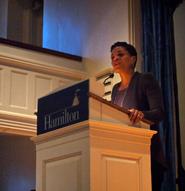
More than half of working-age African American men in the United States have a criminal record. This statistic does not include those who are currently in jail or prison, who have effectively lost their voice and their status as individuals of worth. On April 17, Michelle Alexander, associate professor of law at Ohio State University, presented a lecture on mass incarceration and her bestselling book The New Jim Crow: Mass Incarceration in the Age of Colorblindness. The visit was presented by The Arthur Levitt Public Affairs Center, the Chief Diversity Officer and the Days-Massolo Center.
Alexander explains that she herself did not used to believe that mass incarceration was such an all-encompassing and dangerous problem until an encounter with a black youth shook her attitudes and worldview. This radical change in perspective occurred while she was serving as the director of the Racial Justice Project at the ACLU of Northern California and leading the anti-racial profiling “Driving While Black or Brown Campaign.”
While working on the campaign, a young man walked in with a stack of notes several inches thick detailing his meticulous personal accounts of racial profiling in his neighborhood. The notes were collected over a nine-month period and included names and references of witnesses and police officers involved. In several instances, the man had even taken note of specific officers’ badge numbers. The man became of interest to Alexander because he had the makings of a perfect witness should the campaign bring the police precinct to court. However, as soon as he mentioned that he had been convicted of a drug felony, Alexander felt obligated to turn him down because a jury, and the public, would no longer see him as reliable.
The young man was outraged at her response, claiming that he was innocent and that drugs were planted on his person by police who later beat him and his friends for this possession. Alexander apologized and again rejected his eyewitness accounts. In response, the man told her “you’re no better than the police.” Several months later, Alexander read an article about the Oakland Police Riders, who had planted evidence and subsequently beat suspects. The evidence in the case corroborated the young man’s earlier testimony, providing substantial proof of his innocence. Alexander explained that the young man “was right about me. […] The moment he told me he was a felon, I stopped listening.”
The experience opened Alexander’s eyes to the broader system of injustice and racism in place across the country; poor children, who are often of color, are practically shuttled from schools that are in terrible condition to ironically bright new prisons. Those who leave the prison system are extremely likely to reenter it because they are “branded” as felons, making it exceedingly difficult to find a job, enter public housing, pursue further education, or even get on food stamps. This cycle follows black youth throughout their entire lives—a “cradle to grave” system that is nearly impossible to escape.
Many faults of this broken system can be attributed to the War on Drugs or a “Get Tough” approach to drugs, which unfairly and disproportionately targets poor minorities. According to Alexander, there are more people in prison for drug violations today than there were in 1980 for all other offenses combined. Both sides of the political spectrum have contributed to the increasingly harsh penalties and policies for drug violations; even though white people are just as likely to abuse drugs as any other race, minorities bear a huge majority of the burden.
In addition, laws that allow for confiscation of personal property from those even suspected of drug crimes create an explicit monetary incentive for authorities to keep targeting poor minorities, who are unlikely to fight the court long enough to reclaim their property. The prejudices against minorities in this respect have indeed become so profound, that they amount to no less than a modern-day Jim Crowe.
Despite these seemingly insurmountable challenges, Alexander remains optimistic for change. She outlines three overarching steps that must be taken in order to dismantle this system of injustice, rather than just chip away at it with minor policy changes. First, we must raise awareness of mass incarceration wherever possible. This step is particularly important because there are few visual reminders of how cruel this system can be and how deep it runs. Rather, people must “awaken” to the reality of mass incarceration and educate themselves as well as raise understanding in others.
Second, we must create a culture that is willing to extend help to those who have been incarcerated, an Underground Railroad of sorts that breaks the stigma against former drug felons and helps them assimilate back into society. Finally, the members of this movement must be willing to create a force strong enough to incite real change in the system from the ground up, leaving a rehabilitative, public health model in place of the harmful current punitive method.
When Alexander was first introduced to the Chapel stage, many audience members gave her a standing ovation, already aware of her work. After her lecture the audience’s reaction was explosively positive. Her talk was a powerful and impassioned call to take action against stereotyping and inequality in all its forms.
Posted April 18, 2013
